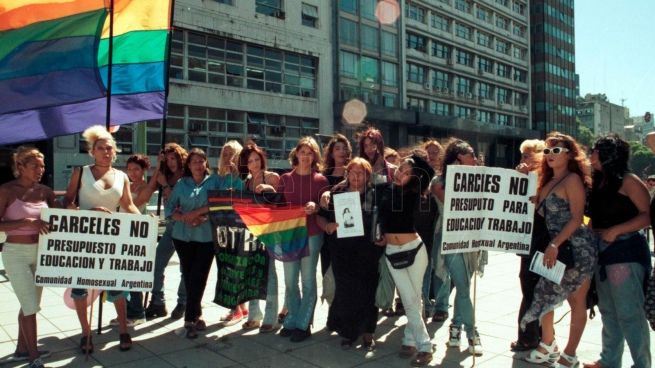Protagonists of the fight for the sanction of the Gender Identity Law, which turns 10 tomorrow, highlighted the rupture that this norm meant worldwide and agreed that “comprehensive reparation” constitutes today the main debt in force with the transvestite population/ trans that suffered the full weight of years of criminalization.
“Thanks to the law, I stopped being a second-class citizen and began to have the same rights as any other person,” The anti-racist trans activist, teacher and theater director, Daniela Ruiz, who campaigned strongly for her sanction, told Télam.
This implies everything from “being able to marry under my name”, to, in the event of a police request, “being able to show him my ID without feeling criminalized for being a racialized transvestite, and therefore exposed to being arrested, imprisoned and raped”.
The lawyer and referent of Lawyers for Sexual Rights (Abosex) explained that the rule implied leaving behind the “psychopathologizing model”
Ruiz, who had twice been denied rectification by justice at the time the rule was sanctioned, remembers perfectly when the new plastic arrived at his house, the way his heart beat as he opened the envelope, and how he thought about ” so many dead compañeras who fought for this and didn’t get to see it”.
The editor of the National Front project that ended up becoming law, Emiliano Litardomaintained in dialogue with Télam, that “with this law, Argentina installs at a global level another way of thinking and managing the right to gender identity that was not associated with judicial or biomedical control.”
The lawyer and referent of Lawyers for Sexual Rights (Abosex) explained that the norm implied leaving behind the “psychopathologizing model” to adopt one “focused on autonomy to express their felt gender and affirm it in a registry, corporal and dignified treatment dimension. ; three dimensions that connect but do not condition each other”.
“The balance is always positive because we are another society and that is very important, beyond the fact that later implementing the spirit of the law in daily life is difficult because it depends on many factors in such a large and complex territory.Marlene Wayar
For the trans referent and also a member of the Front, Marlene Wayar, “the spirit of the law in everyday life is sometimes very difficult to apply” due to the obstacles represented by administrative bureaucracies, discrimination, and some rigidities in the interpretation of the law. rule.
“The balance is always positive because we are another society and that is very important, beyond the fact that later implementing the spirit of the law in daily life is difficult because it depends on many factors in such a large and complex territory, among them administratively small issues, of class and race,” he said.
And he added that “the most important pillars of the law – which are non-pathologization, non-criminalization and non-judicialization– is precisely what is still under discussion today, because if we are the only people capable of defining our identity, why are there legal and administrative issues that continue to condition us in the binary?
“It has been a beacon for many struggles that today have an impact even within the State itself, such as the law of inclusion and trans labor quota, which speaks of a comprehensive view of the territory and intersectionalities”Daniela Ruiz
In his turn, Ruiz highlighted “the advances of transfeminism and the anti-racist struggle” as a result of 10 years of validity of the gender identity law.
“It has been a beacon for many struggles that today have an impact even within the State itself, such as the trans inclusion and labor quota law, which speaks of a comprehensive view of the territory and intersectionalities.”

Litardo, for his part, recalled that “between 2010 and 2011, three bills coexisted in the National Congress that sought to regulate the right to gender identity with different legal strategies and theoretical foundations.”
“If one had to narrate the history of the law, one must speak of multiple plots that were linked in a complex process that involved different social actors in a political struggle for a model of gender identity that was most receptive and respectful of the experiences of transvestite trans identities, with the full participation of the movements,” he explained.
“As of May 2012, this depathologizing model is installed according to which there is no gender identity that in itself should be classified as a disease or sexual health disorderEmiliano Litardo
In this sense, Litardo explained that “the gestation process” of this avant-garde law at the global level was nurtured by different “articulations” such as the one between trans theories and those of critical feminism; between the transfeminist academy and the political/territorial militancy of sexual diversity agendas; between a population that demanded rights with “a government that enabled public debate and allowed active and committed listening”; between political and legal activism, among others.
In this last sense, he recalled that “We started lawsuits throughout the country” demanding the change of name and gender on the DNI and birth certificate “with other types of arguments” more in line with what the Yogyakarta Principles proposed, “and luckily a certain part of the Judiciary contributed with its rulings to strengthen the content of a depathologizing project.”

From the first ruling that in 1997 granted the registration rectification to a trans person and for more than 10 years, the court rulings enshrined “a scheme of authorizations conditioned to medical or psychiatric treatment and surgical interventions, which will change when the first rulings begin to come out in the City of Buenos Aires that respect the affirmed gender without subjecting people to intervention processes surgical or biomedical” such as the one that benefited Florencia de la V in 2010.
“The law has legitimized the fact that many people have allowed themselves to shake off prejudices and take transvestites as just another neighbor”Marlene Wayar
“As of May 2012, this depathologizing model is installed according to which there is no gender identity that in itself should be classified as a disease or disorder of sexual health, that all people have a gender identity and that this It’s based on a personal statement,” he said.
And he added: “It also involves the State in the construction of gender identity because although this process is personal, It has an important social projection that, in order to guarantee it, requires an active intervention of the state, such as for access to surgical interventions and hormonal treatments”.
Ten years later, “the law has legitimized the fact that many people have allowed themselves to shake off prejudices and treat transvestite trans people as just another neighbor,” Wayer said, which “has provoked many solidarity actions on the part of specific people, of institutions of the State and even private companies that, for example, try to have a job quota”.
“The most important pillars of the law -which are non-pathologization, non-criminalization and non-judicialization- is precisely what is still under discussion today, because if we are the only people capable of defining our identity, why are there legal questions? and administrative that continue to condition us in the binary?”Marlene Wayar
The three pointed out that the next legislative step should be historical reparation for transvestites, that is, financial compensation for all trans people over 40 who suffered years of constant arrests, harassment and institutional violence just because of their identity.
“At 46, I can also say that I am a survivor because I have experienced that violence in my body and I don’t know how far I am going to go. Reparation is possible because there are very few survivors and it cannot be that today they do not have a home. , a social plan, or even the DNI for immigration processes or because they are unaware of their rights,” he concluded.


















